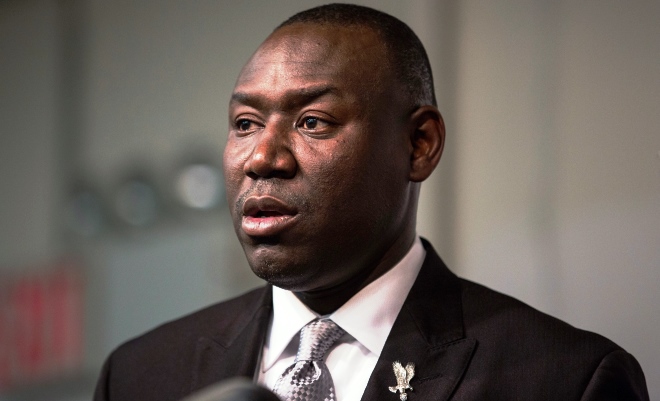Ben Crump: Police Body Cams Make Sense Even After Garner Decision
EXCLUSIVE: Brown Family Lawyer: Police Body Cams Still Make Sense, Even After Garner Decision

Attorney Benjamin Crump in November 2014 (Getty Images)
In the wake of the grand jury decision in Ferguson, Mo. to not indict police officer Darren Wilson in the shooting death of unarmed 18-year-old Michael Brown, President Barack Obama unveiled plans to address rising distrust between law enforcement and people in many minority communities. A centerpiece of those plans is a proposed three-year, $263 million investment package that will increase use of body-worn cameras among police officers.
Proponents of body cams, such as President Obama and New York’s mayor Bill de Blasio, add “transparency and accountability,” (the mayor’s words) to interactions between officers and the people they police. If in doubt about whether an arrest gone wrong was justified, the theory goes, just go to the video and see what happened.
So what does the grand jury’s decision not to indict New York police officer Daniel Pantaleo in the death of Eric Garner do to that theory? A cellphone video clearly shows Garner being held in a chokehold by Officer Pantaleo while in a scrum with several police officers on a Staten Island street; he can be heard saying he cannot breathe; and he later died while in custody and the city medical examiner later ruled that he died by compression of the neck.
If that video evidence wasn’t enough to warrant even an indictment on a single charge, what good are police body cameras?
“We need the body cameras,” says Benjamin Crump, one of the attorneys for the family of Michael Brown. His clients have called for nationwide adoption of police body cameras. “There’s not a problem with the video. The video works, and even showed us transparency. What is broken is the system. It’s the system that caused us not to get justice. We need video. Can you imagine what the narrative would have been if [the encounter between Garner and the police officers] was not on video?”
Still, it’s clear that transparency wasn’t enough for an indictment in the case against Pantaleo. “I couldn’t believe it after the decision came. It was just shocking,” Crump remarked. He added that this decision, on the heels of the Brown grand jury decision, beg the question,”What scenario can we give you to indict a police officer for killing a person of color?”
It’s a question he’ll need to address as co-counsel for the family in yet another case of an unarmed black man fatally shot by a police officer. Akai Gurley was shot in a dark stairwell by a rookie police officer in an situation where even the New York police chief called the victim a “total innocent” who was shot by accident.
RELATED STORY: Akai Gurley: Family Of NYC Man Killed By Police Seeks Answers [VIDEO]
Meanwhile, said Crump, the Brown family will be among those joining Rev. Al Sharpton on a march in Washington, D.C. on Saturday, Dec. 13 to ask the U.S. Department of Justice to further investigate the Eric Garner, Michael Brown and Tamir Rice cases. The Garner family offered moral support to the Brown family when meeting them in New York City last week after the Ferguson grand jury decision had been announced. At the time, Garner’s family was “confident that they were going to get an indictment, as I was confident,” said Crump. “So now, the Brown family’s going to have to offer them support,” he observed.
When asked how Michael Brown’s mother, Lesley McSpadden and stepfather, Louis Head, are otherwise doing, Crump answered, “They’re doing as well as can be expected.” As previously reported, they have been facing possible legal fallout from Head’s outburst last week after the grand jury decided not to indict Officer Darren Wilson in the death of his stepson. Head has since apologized.
SEE ALSO:
White House Urges Body Cams, Overhauls To Military Gear Program In Ferguson Aftermath
Garner’s Widow Says “Hell No,” She Doesn’t Accept Officer Pantaleo’s Condolences















